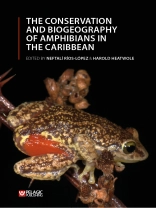An expansive and detailed review of the biology of Caribbean amphibians, considering their threats, conservation and outlook in a changing world. Amphibians are the group of vertebrates undergoing the fastest rate of extinction; it is urgent that we understand the causes of this and find means of protecting them.
This landmark illustrated volume brings together the leading experts in the field. As well as offering an overview of the region as a whole, individual chapters are devoted to each island or island-group and the measures used to protect their amphibians through legislation or nature reserves. The biological background of insular biogeography, including its methods, analysis and results, is reviewed and applied specifically to the problems of Caribbean amphibians – this includes a re-examination of patterns and general ideas about the status of amphibians in the Anthropocene.
The Conservation and Biogeography of Amphibians in the Caribbean offers an important baseline against which future amphibian conservation can be measured in the face of climate change, rising sea level and a burgeoning human population. Covers over 300 species.
Table of Content
1. Theories of Insular Biogeography and Ecology Harold Heatwole and Neftalí Ríos-López
2. Amphibians of the Bahamas and Turks and Caicos Islands R. Graham Reynolds and Sean T. Giery
3. The Amphibians of Cuba: integrative insight into the diversity and conservation of a highly vulnerable fauna Luis M. Díaz, Ansel Fong G., Alberto R. Estrada, Antonio Cádiz, Amnerys González, Rolando Fernández de Arcila, Irelis Bignotte-Giró, and Sixto J. Incháustegui
4. The Southwestern Caribbean Islands Harold Heatwole and Javier Sunyer
5. Amphibians of Jamaica K. Stephenson and B. Wilson
6. Status of amphibians in the Republic of Haiti: a review Neftalí Ríos-López
7. Status of amphibian conservation and decline in the Dominican Republic, Hispaniola Sixto J. Incháustegui and Luis M. Díaz
8. Amphibians and their history, distribution, and conservation in Puerto Rico and the Virgin Islands Neftalí Ríos-López, Alberto R. Puente-Rolón, Nicole F. Angeli, Sondra I. Vega-Castillo, and Daniel Dávila-Casanova
9. Amphibians of the Lesser Antilles Robert Powell and Robert W. Henderson
10. Amphibians of Aruba, Curaçao, and Bonaire Gerard van Buurt
11. The Venezuelan Islands Harold Heatwole
12. Amphibians and their Conservation in Trinidad and Tobago Renoir J. Auguste, J. Roger Downie, Michael J. Jowers, Richard M. Lehtinen, Ryan S. Mohammed, and John C. Murphy
13. Amphibians of the Bocas Del Toro Archipelago, Republic of Panama Sandra P. Galeano, Layla Freeborn, and Ricardo Cossio
About the author
Harold Heatwole is an ecologist and herpetologist. His first Ph D (University of Michigan) dealt with habitat use by amphibians, but then he branched out and studied other taxa, mostly reptiles and amphibians, but also ants, tardigrades, and seabirds. He earned a second Ph D in Botany with a dissertation on the dynamics of vegetation on coral cays on the Great Barrier Reef of Australia (University of Queensland). He completed his education with a Ph D in Geography (James Cook University) and a Ds C (University of New England, Australia). He had faculty appointments at the University of Puerto Rico, University of New England, and currently is Professor of Biology at North Carolina State University and Adjunct Professor of Zoology at the University of New England. He is editor in Chief of the journal Integrative and Comparative Biology. He is a Fellow of the Explorers Club.












